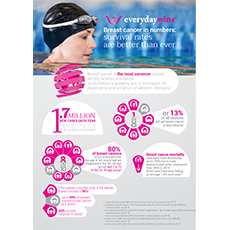Treatment Options
A diagnosis of breast cancer can be overwhelming. However, when trying to overcome fears about breast cancer, remember that with better treatments more women are surviving breast cancer than ever.1
Today, more than ever, there are many more advances in life-saving treatments against breast cancer that can help destroy and remove cancer cells. Treatment may involve one or even a combination of different options. Together with your doctor, the best treatment plan can be decided depending on individual needs and the type of breast cancer.2
A range of treatment options for breast cancer
Depending on the type and stage of cancer, treatment may include different types of surgery [breast-conserving surgery (lumpectomy), mastectomy and lymph node dissection], chemotherapy, radiation therapy, hormonal treatment and targeted therapies (treatments that target specific receptors of the cancer cells).2,3
The great majority of breast cancers are oestrogen-dependent (about 80%). In these cases, hormone therapy can be used, which helps to slow or stop the growth of hormone-sensitive cancers by interfering with the body’s ability to produce hormones or by interfering with the action of hormones.These types of medicines are not effective against hormone-receptor-negative breast cancers. Remember that hormone therapy for breast cancer is not the same as therapies in which hormones are given to reduce the symptoms of menopause.5,6
Each type of treatment for breast cancer may be associated with different types of side effects.
Some examples of side effects
- Chemotherapy is sometimes associated with fatigue, hair loss, low white cell and platelet counts, anaemia (low red blood cell counts), nausea, and vomiting7
- Radiation therapy can damage normal and healthy cells near the cancer8
- The most common side effects of hormone therapy are hot flushes, night sweats, and vaginal dryness, but other side effects are possible depending on the individual treatment9
- If you are having pain, there are many kinds of medicines that can help provide relief, as well as methods that may not involve drugs10
Don’t be afraid to talk to your doctors to get help addressing any side effects that may occur. Remember, everyone is different and it is unlikely that you will experience all of these side effects. Some women only experience very few or have only mild ones.11
Effects on your psyche
In addition to physical side effects, it is normal that breast cancer also causes distress as well as anxiety, fear, insomnia and depression. Your cancer care team can help to find the most effective way to deal with any psychological symptoms that may arise. Talking with others and maintaining social support are definitely ways that can help one to cope with the stress of breast cancer and its treatment.12
Keep in mind that side effects also vary from person to person, and might even limit your ability to do some things.13 As for any type of therapy, be sure to talk to your doctor and nurse about which side effects are most common with your therapy, how long they will last, and how bad they may be.
The importance of sticking to treatment
Breast cancer treatment is most effective when you comply with every aspect of your doctor’s treatment plan. It is therefore important to follow the treatment plan (medications and other therapies) prescribed by your health care provider in terms of:14
- Timing
- Dosing
- Frequency
- Duration
Research has shown that taking your medication for a sufficient period of time is crucial for the success of your breast cancer therapy. The extent to which you take your prescribed medication is known as compliance. In the past, compliance meant patients had to passively abide by their doctor’s treatment. Today, compliance can be achieved through an actual communicative, cooperative exchange between you and your doctor.15 If, for example, the side effects of treatment are becoming unbearable, see with your doctor to decide together what can be done.
References
- https://www.cancer.net/cancertypes/breastcancer/statistics [Last accessed June 2017].
- http://www.breastcancer.org/treatment [Last accessed June 2017].
- http://www.breastcancer.org/treatment/targeted_therapies [Last accessed June 2017].
- http://www.breastcancer.org/symptoms/diagnosis/hormone_status/read_results [Last accessed June 2017].
- https://www.cancer.gov/types/breast/breast-hormone-therapy-fact-sheet [Last accessed June 2017].
- https://www.cancer.org/cancer/breast-cancer/understanding-a-breast-cancer-diagnosibreast-cancer-hormone-receptor-status.html [Last accessed June 2017].
- https://www.cancer.net/navigating-cancer-care/how-cancer-treated/chemotherapy/side-effects-chemotherapy [Last accessed June 2017].
- https://www.cancer.net/navigating-cancer-care/how-cancer-treated/radiation-therapy/side-effects-radiation-therapy [Last accessed June 2017].
- https://www.cancer.gov/types/breast/breast-hormone-therapy-fact-sheet#q6 [Last accessed June 2017].
- http://www.breastcancer.org/treatment/pain/meds [Last accessed June 2017].
- https://www.cancer.org/treatment/treatments-and-side-effects/emotional-side-effects/anxiety-fear-depression.html [Last accessed January 2018].
- https://www.cancer.org/treatment/treatments-and-side-effects/emotional-side-effects/anxiety-fear-depression.html [Last accessed June 2017].
- https://ww5.komen.org/BreastCancer/Adherence.html [Last accessed November 2017].
- https://ww5.komen.org/BreastCancer/Adherence.html [Last accessed November 2017].
- Kostev K, et al. Ger Med Sci. 2014;12:Doc03.

Breast cancer in numbers: survival rates are better than ever
PDF - 601 Kb



